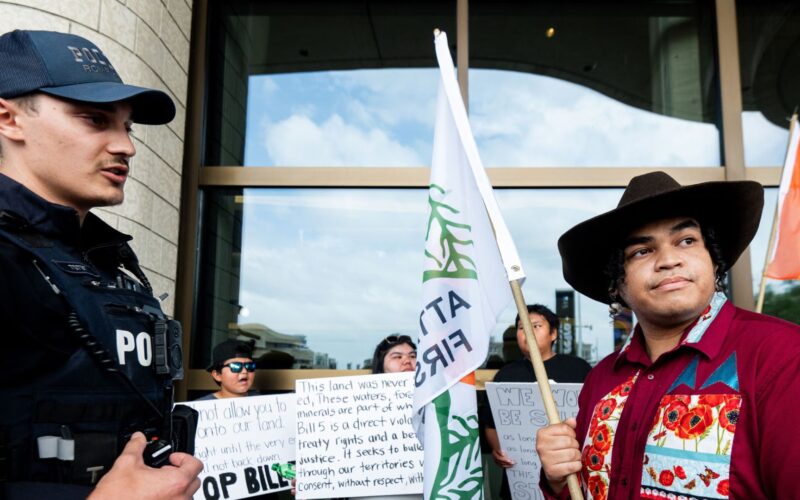Gatineau, Quebec (Rajeev Sharma): What was intended to be a conciliatory meeting between Canadian Prime Minister Mark Carney and First Nations leaders turned contentious on Thursday, as multiple Indigenous representatives walked out in protest over the Building Canada Act, citing deep concerns about violations of their rights and lack of genuine consultation.
The meeting, held at the Canadian Museum of History, was meant to allay growing unease among Indigenous communities about the act, which was passed last month as part of Bill C-5. The legislation outlines a fast-track framework for infrastructure and resource development projects — including pipelines, mines, ports, railways, and energy grids — deemed “nation-building.”
Carney has championed the act as part of his broader strategy to reduce Canada’s economic dependence on the U.S., especially amid threats of steep tariffs from former President Donald Trump. However, many First Nations leaders see the law as a direct threat to their constitutionally protected rights.
Though the act claims to support Indigenous interests and climate goals, it also allows designated projects to bypass environmental and planning regulations. Critics argue this effectively sidelines Indigenous communities from key decisions affecting their lands and livelihoods.
Earlier this week, nine First Nations in Ontario filed a constitutional challenge against both the federal government and the provincial government over Bill C-5 and similar regional legislation. They argue that fast-tracked projects without proper oversight or consultation violate their treaty rights under the Canadian Constitution.
At Thursday’s meeting, Carney promised that affected Indigenous communities would be thoroughly consulted before any development begins and that the new infrastructure would benefit future generations. Yet the mood in the room was far from reassured.
Many leaders voiced frustration at being denied speaking time, saying the event felt like a one-sided public relations effort. “This is not engagement. This is definitely not consultation. I’m speechless,” said Grand Chief Cody Diabo of the Mohawk Council of Kahnawake, who was among those who walked out.
Protest signs carried by a group of Indigenous youth, reading “We won’t be silenced,” added to the visible discontent. Deputy Chief Gwii Lok’im Gibuu (Jesse Stoeppler) of the Hagwilget Village Council in B.C. said he had little faith in the process from the beginning and left feeling even more concerned.
Legal experts warned that the government may be underestimating the legal and political consequences of rushing legislation without meaningful consultation. Bruce McIvor, Indigenous rights lawyer and adjunct professor at the University of British Columbia, criticized the federal approach.
“What’s required under Canadian law is early, thorough engagement — not decisions made in advance with a promise to ‘consult later’,” McIvor said. “This looks more like damage control than genuine dialogue.”
Despite the backlash, Carney said he plans to hold more regional dialogues with Indigenous communities over the summer. Some leaders, like Chief John Powell of the Mamalilikulla First Nation, said Carney appeared sincere in brief private conversations, but warned that trust was still lacking.
“The fear is that they’ll push these projects through,” said Powell. “We’ve had over 150 years of governments extracting what they call ‘resources,’ but what we see as our ‘responsibility’.”
As pressure mounts, Carney and his government face a critical test in repairing strained relationships with First Nations — or risk further legal battles and widespread protest.

